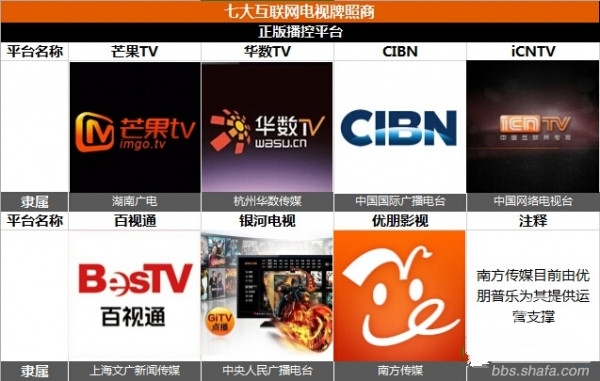1. The direction of television media transformation. From the traditional television production, broadcast to the Internet TV platform operation, become the direction of television media transformation, the strategy has been very clear. Traditional television media that cannot successfully transform Internet TV will become history.
2, 7 OTT licensees change. After four years of baptism, the seven legitimate market players in the OTT market have changed. Shanghai Media Group regards Internet TV as the strategic transformation direction of the entire group, demonstrating the profound insight and determination of traditional TV transition to the Internet. Hunan Radio and TV also has an Internet TV from the top strategic layout. The progress of Mango TV is remarkable. Hua Digital Media has raised 6.2 billion from Ali, but its Internet TV lacks the "TV broadcasts" gene and the Internet TV strategy is vague. In addition, CNTV TV in the future still lacks strategic deployment and support from CCTV and is weak enough to almost quit the OTT rivers. The CCB Galaxy and CIBN themselves have no maternal resources and borrow money or continue to play "licenses." The Southern Media Rental Licence had nothing to gain in more than three years and began to redeploy from scratch.
3. Strictly speaking, only 2.5 players are currently among the 7 licensees. Shanghai Wenguang, Hunan Radio and Television counted two, China Media counted half, CCTV has pulled down, but as long as the strategy is in place will be a big player.

4, Shanghai Wenguang. Uncle Li’s comeback positioned Shanghai Wenguang’s strategy as a new type of television media group in the Internet era, using Internet TV as the transformation direction of the entire Taiwanese. Deploying Internet TV in three dimensions: capital, content, and platform, it can be predicted that Shanghai Wenguang will become the first state-owned TV and radio TV network to successfully transform itself within two years. In terms of resources, capital strength, and content production, there is no pressure to surpass video sites. As a large group, its resource integration and execution efficiency will determine the speed of Shanghai Media's Internet TV development.
5, Hunan Radio and Television. Hunan Radio and TV also deployed TV new media personally from top executives to fully support Mango TV from the exclusive broadcast of exclusive variety shows, capital support, and capital operations. However, the overall strategic layout of Hunan Radio and Television is not yet clear, and mango's technology platform and operating capability still have a big gap. Although it is already in the front of the traditional TV transition, there are still some variables in the follow-up development.
6, CCTV. CCTV's Internet TV has always been done by TVTV's joint venture company's future TV. CCTV itself has basically not provided support, and it has not paid much attention to it strategically. For CCTV, political propaganda is the primary task. In the past year or more, it has been plunged into a vortex of corruption. The leadership has never regarded the strategic transformation of Taiwan as a core task, and strived for stability rather than development. Under the circumstances of the overall strength of Shanghai, Hunan, and China, as well as the use of licenses by the other three companies, CNTV has been in an awkward position to independently develop Internet TV in the future. The biggest problem with CCTV's Internet TV is the lack of an overall strategy. Once the CCTV director has deployed Internet TV as the focus of transformation, CCTV Internet TV will undoubtedly have the imagination of the industry leader.
7. Hua Digital Media. The network operator of Hua Digital Media originates, lacks the media gene of TV stations, and the realistic vision of Zhejiang businessmen. As a strategic business, Internet TV needs to make huge investments and it is difficult to make profits in the short term, making it impossible for Huadian to locate Internet TV. Your own core development strategy. It is indeed a question whether the alliance with Ali and the cooperation of the operator can create an Internet TV operator. Therefore, China is only half the player of Internet TV.
8, CIBN and Yangguang Galaxy. CIBN and Galaxy have a background as radio stations. There is a lack of content on TV. Internet TV is a new life but it is a battlefield for giants. New players have little chance. CIBN chose to cooperate with Youku. Youku Curve gained the opportunity to develop Internet TV and hoped to make a breakthrough in the value-added services of Internet TV games. Yangguang Yinhe chose to cooperate with iQiyi and loved Qiyi’s access to Internet TV through the CNG license. From CIBN and Galaxy itself, it is not really the mainstream player of Internet TV.
9, South Media. Guangdong TV station obtained the Internet TV license, and the operator has always been Premium Pole. The main business focus of Lon Peng's Lending license is to cooperate with the telecom operators. However, no significant development has been achieved. Guangdong’s Taiwanese side has been indifferent to Internet TV. A few days ago, a new company was set up to do Internet TV. This time it was really not Alexander.
10. In fact, in addition to seven Internet TV licensees, BAT Xiaomi has four Internet companies and commercial video websites that are powerful competitors in Internet TV. The future pattern of Internet TV may be: Ali, Tencent, iQiyi, Shanghai Media, Hunan Radio and TV, CCTV six competing for hegemony.
Blue Sea Lighting Co., Limited , http://www.gz-led-light.com